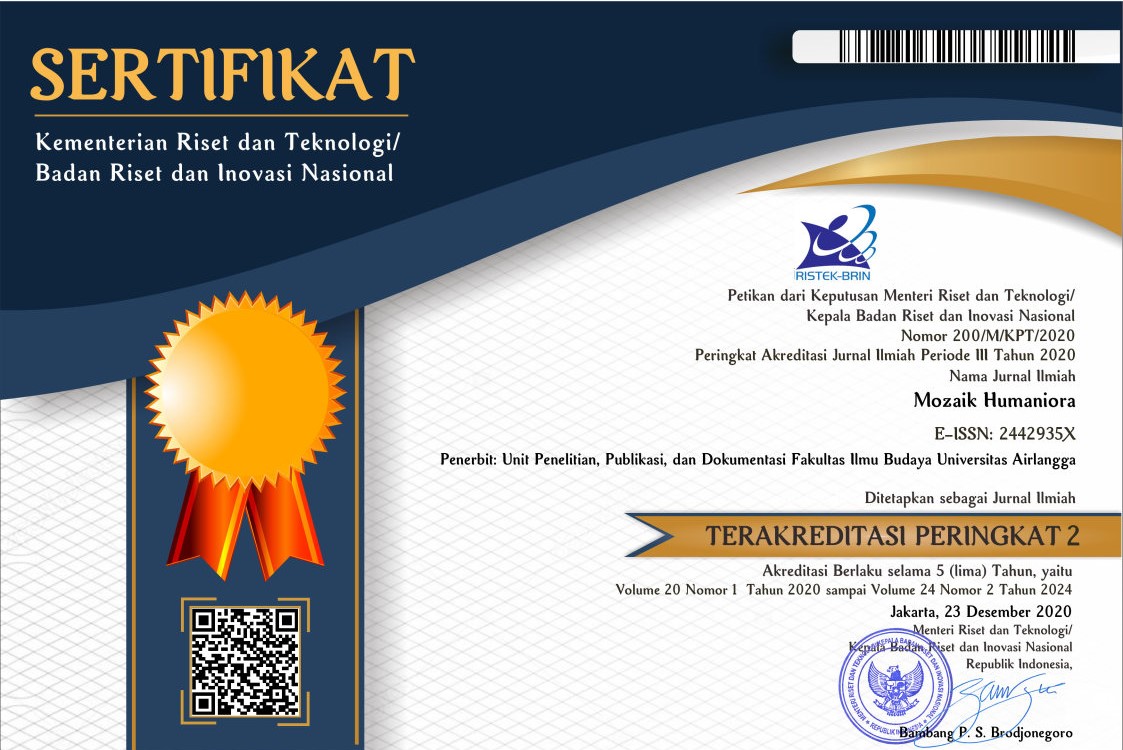What is Clean? Interpreting the Meaning of Healthy Urban Environment in Malang (1930-1960)
Downloads
Abstrak
Sejak akhir abad ke-19, baik pemerintah kolonial Belanda maupun penguasaha swasta telah membuat kemajuan ekonomi yang pesat. Sumbangan penting usaha perkebunan pada perekonomian telah memicu perkembangan pemukiman penduduk. Ketika urbanisasi meningkat sementara ruang kota justru semakin besar, masalah baru bermunculan, seperti persoalan kebersihan lingkungan. Penurunan kualitas lingkungan berdampak pada penurunan kualitas kesehatan. Kualitas hidup penduduk, baik dari kalangan Eropa maupun pribumi, semakin terancam manakala sejumlah penyakit tropis berpotensi menjadi wabah yang menyerang seluruh penduduk kota. Dengan memanfaatkan metode sejarah, artikel ini bertujuan menjelaskan bagaimana sikap penduduk dan pemerintah berkaitan dengan pengaturan lingkungan bersih selama kurun waktu 1930-1960. Hasil penelitian ini menunjukkan bahwa terdapat perbedaan pemahaman masyarakat pada masa kolonial dan pada masa kemerdekaan. Apabila pada masa kolonial terdapat garis pemisah yang tajam antara penduduk Eropa dan pribumi sehingga memengaruhi persepsi masalah kebersihan lingkungan, pada masa kemerdekaan pemisahan tersebut tidak muncul. Perubahan yang dramatis terjadi ketika muncul program perbaikan jalan dan pelayanan kesehatan yang dilaksanakan oleh pemerintah.
Kata kunci: kebersihan, kesehatan, lingkungan perkotaan, persepsi, Malang
Abstract
Since the last decade of the nineteenth century, both the Dutch colonial government and private enterprises have made great economic progression. The crucial contribution of plantation industry to the colonial economy has triggered the improvement of particularly settlement. Job opportunities invited peoples from nearby villages. This was the beginning of urban environment problem. The decline of the environmental quality had to do with the decrease of the health quality. The dwindling health quality among the native inhabitants brought about potential outbreak of tropical diseases that could spread and finally hit all city inhabitants. The epidemic would threaten the Europeans who shared the same space with the natives. Using historical method, the writer tried to discuss the response of Kampung dwellers to "urbanized process” in terms of environment. This article is based on archival document from Dutch Indies colonial Government and Dinas Kesehatan Kota Malang. The present study addressed the concept of "positioning” by looking at the influence of new Municipal-made environment from a historical point of view. From the research it can be concluded that since 1937, the Municipal government has begun to increase more technical personals and budgets to maintain many infrastructure projects. In comparison with the situation in the colonial periods in which the Municipal governments never included the Kampung inhabitants on their urban sphere, the era of the Indonesian Republic had showed the different situation. The dramatic change on the composition of local parliament paved the way for Kampung resident on the drafting of local regulation including health service.
Keywords: clean, health, Malang, perception, urban environment

Mozaik Humaniora is licensed under a Creative Commons Attribution-ShareAlike 4.0 International License. Both authors and Mozaik Humaniora agree with the following attribution of journal:
1. Copyright of this journal is possession of Author, by the knowledge of the Editorial Board and Journal Manager, while the moral right of the publication belongs to the author.
2. The journal allows the author(s) to retain publishing rights without restrictions
3. The legal formal aspect of journal publication accessibility refers to Creative Commons Attribution Share-Alike (CC BY-SA).
4. The Creative Commons Attribution Share-Alike (CC BY-SA) license allows re-distribution and re-use of a licensed work on the conditions that the creator is appropriately credited and that any derivative work is made available under "the same, similar or a compatible license”. Other than the conditions mentioned above, the editorial board is not responsible for copyright violation.


















